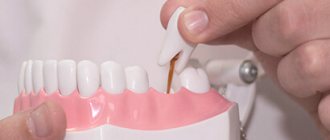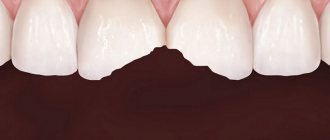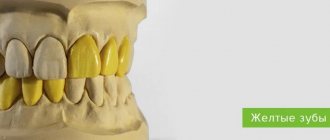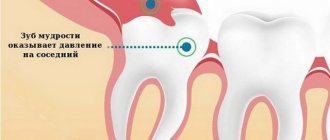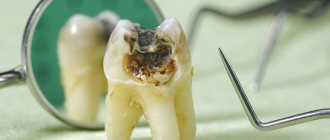Unfortunately, due to many reasons, such health problems occur that teeth simply crumble. This can occur at different ages, with baby teeth in children and permanent teeth in adults. What to do? Of course, you should see a doctor. Go to the dentist, and after the examination he can refer you to a specialist and advise you to undergo an examination.
Symptoms
It is difficult to miss such a fact when a tooth has crumbled. This usually occurs while eating, and a hard piece of enamel is felt in the mouth. Sometimes there are many small pieces at once. There is a feeling of panic. After all, we know from school that enamel is the hardest tissue in the body. Why does this happen, causing teeth to crumble and crack?
It happens that it all starts with stains on the enamel - this is a symptom that not everything is in order. And you need to make a visit to the dentist before the crown of the tooth collapses.
Prevention of tooth decay
To strengthen tooth enamel, you need to:
- comply with oral hygiene standards;
- consume less sweets, rinse your mouth regularly after sour or spicy foods;
- Be sure to come for preventive examinations at the dentist twice a year, have professional cleaning and strengthening procedures;
- monitor your diet;
- stop smoking and bad habits (do not bite hard objects and nails);
- Drink only clean drinking water.
Reasons why teeth may crumble
The answer to the question of why teeth crumble in an adult or child can be not only in the field of dentistry, but also much deeper, and everything is reflected in the condition of the dentition.
Causes:
- poor
oral hygiene. And no matter how they say that everyone always talks about the importance of the procedure, it is so. An acidic environment has a destructive effect on enamel, making it fragile and vulnerable. Increased acidity is affected by plaque on the teeth, which is where bacteria and their waste products—destructive acid—accumulate; - untreated caries
and other diseases, when there is a lot of carious tissue and the walls of the tooth become thinner. As a result, the tooth began to crumble; - mechanical causes
: trauma, super-hard food - nuts, chewing candy, etc., bad habits - chewing pencils, objects, opening a bottle with your teeth. As a result, the tooth cracked and broke; - changes in
food temperature. Very hot suddenly gives way to cold. The enamel does not withstand, cracks appear; - lack of vitamins
and minerals: calcium, vitamin D (which promotes the absorption of calcium), fluorine, phosphorus; - metabolic disease
. It is worth visiting an endocrinologist; - hormonal imbalance
. These are not only diseases associated with hormonal levels and fluctuations, but also special periods in a person’s life - adolescence and old age, menopause, pregnancy; - heredity
. Genetic predisposition to weak enamel; - stress
; - malocclusion
- uneven load on the lower and upper teeth; - Bruxism
is involuntary grinding of teeth during the day or at night.
Video from our expert about how and why teeth decay:
Teeth quickly decay due to chronic diseases, diseases of the gastrointestinal tract and endocrine glands. And crumbling teeth is a signal that needs to be responded to urgently.
If teeth crumble and fall apart - what to do depending on the reasons
Fortunately, there are methods, and they are quite effective. All that is required from the patient is adherence to treatment and compliance with hygiene rules.
Installation of seals
Filling is a modern way of dealing with the problem, which has greatly progressed and developed in recent years. Now a light-curing material is placed on the chipped areas, which hardens quickly and lasts a long time without requiring replacement. It can be given the required shade and shape, so that it looks like native enamel.
Professional oral hygiene
It is advisable to carry it out every six months. This is an excellent prevention of caries, erosion and gum disease, which helps to maintain good health and use the services of a dentist as little as possible.
Crowns, veneers
If a regular filling is not enough, install an “onlay” made of ceramic or porcelain - it will restore its aesthetic appeal and chewing function. Its service life varies from several years to a couple of dozens.
Mineralizing procedures
Applications containing the necessary mineral substances for enamel are applied to the damaged parts. Usually several manipulations are required, but sometimes one is enough.
Coating teeth with fluoride varnish
Also used for restoration, but contraindicated for fluorosis. Fluoride and calcium are the main chemical elements needed for remineralization and are often used in rotation. The varnish is safe for the body; it is a dark brown substance with a viscous consistency and smells of pine needles.
Taking multivitamins
If the problem is caused by a deficiency of nutrients, as prescribed by your doctor, you should take a course of medications that will solve it. Some doctors prescribe remedies at their discretion without testing, but practice shows that in most cases it is still necessary to take a test to determine a lack of minerals or vitamins. In addition, sometimes disorders are caused not by a small content of elements in the blood, but by their excess - in this situation it is necessary to adjust the diet.
Teeth began to crumble during pregnancy
For the development of the fetus, calcium is necessary, which the child receives from the body of the expectant mother. A woman experiences a deficiency if she does not eat well and does not take it additionally in the form of supplements or mineral complexes. Teeth may be destroyed, which occurs quite often in this “interesting position.”
The next factor influencing the weakness of dental tissue may be a hormonal surge during pregnancy and the nervousness of the mother.
Necessary:
- take care of a sufficient supply of calcium
in the body, because it also affects the development of the skeletal system (including the rudiments of teeth) of the unborn child. Eat a balanced diet, if necessary, take active supplements with calcium and vitamin D prescribed by your doctor; - don’t be nervous,
and walk more - be observed
during pregnancy by a gynecologist, dentist, or other doctors, if indicated.
Teeth can crumble not only during pregnancy, but also during lactation. With mother's milk, calcium is transferred to the baby.
Symptoms of tooth decay
Of course, when a tooth begins to clearly crumble, you can see it immediately or feel it with your tongue. However, it is possible to “catch” the moment when crumbling has not yet occurred, but all the symptoms indicate the imminent onset of this unpleasant process. If the patient begins to sound the alarm in time and turns to the dentist for help, the final destruction and loss of the tooth can be avoided. So, the following symptoms may indicate impending tooth decay:
- Tooth enamel turns yellow;
- Small cracks appear on the teeth;
- The tooth becomes extremely sensitive to cold and hot food;
- The appearance of immediate chips of the tooth;
- At a late stage, bone tissue rots, which is accompanied by bad breath.
If you notice that your teeth are about to “crumble” or are already actively doing so, immediately visit the dentist; the sooner you do this, the greater the likelihood that the doctor will save the tooth.
There are often patients who wait until the last minute and apply only when the doctor can only remove the tooth painlessly; this is very irresponsible. A decayed tooth is unable to perform its main function - thoroughly grinding food before it goes into the esophagus and then into the stomach. Too large pieces of food can cause indigestion and multiple problems in the digestive system.
How to get rid of the problem, solution methods
The dentist will decide how to stop tooth decay after identifying the cause. If treatment by other doctors is necessary, then in parallel it is already possible to begin the restoration of dental units.
Dental restoration methods:
- filling.
Installing a filling in place of the missing piece of tissue. If the carious cavity is large enough and the walls are fragile, then an inlay with a composite material may be indicated; - veneers.
If there is a chip or crack in the front teeth of the frontal area, a thin ceramic overlay will correct the situation, hiding all the defects; - crowns
When the crown of a tooth is severely damaged, the doctor may recommend installing an artificial one from the selected material. Most often these are metal ceramics, ceramics, zirconium dioxide. It is important what condition the gums are in; - remineralization.
Restoring the normal balance of vitamins in the enamel structure. A special composition is applied to the surface of the teeth for several minutes. The tissue is saturated, enriched with calcium, fluoride, becomes stronger and can even remove caries at the chalk spot stage; - fluoridation.
Fluoride-containing pastes nourish the enamel. Fluorine is responsible for crystalline calcium compounds. Fluoride varnish seals dentinal tubules, strengthening teeth; - taking active
calcium and vitamin D
The ecological situation of the region of residence is one of the causes of dental health pathologies. The quality of air, water and food is far from ideal. Replenish the deficiency with complex supplements, spend your weekends in nature. Love organic farm products.
What to do to strengthen enamel
Once the cause of the disease is determined, the doctor prescribes treatment. If the cause of tooth decay is untreated caries or mechanical damage, then the issue can be solved with the help of prosthetics. If the problem is a lack of vitamins or changes in hormonal levels, then specialized specialists will be involved in the treatment process.
What to do if the tooth is completely crumbled
The crown part of the tooth has completely crumbled, what should I do? You must make an appointment with a doctor at a dental clinic within two days. After the x-ray, it will be clear whether the root is preserved, what condition it is in, and whether removal is necessary. Then possible recovery options:
- prosthetics (stump inlays, pins, crowns and bridges);
- implantation (implantation of a titanium artificial root into bone tissue followed by installation of a crown).
In any case, modern techniques are sufficient to compensate for any loss of teeth.
Habits that ruin your teeth every day
| Regular sweet snacks form plaque and destroy enamel |
| Biting foreign objects creates cracks |
| Bruxism: Teeth grinding at night causes tooth wear |
| Large amounts of citrus fruits: acid destroys enamel |
| Drinks with bright pigments stain tooth enamel |
| Improper brushing of teeth destroys enamel and injures gums |
| Frequent whitening with folk remedies destroys enamel and increases sensitivity |
How is diagnostics carried out?
Are your teeth starting to crumble? Don't hesitate to see a doctor. Only a specialist can correctly determine the cause of the pathology. The dentist will conduct a visual examination of the oral cavity, collect anamnesis, and assess the degree of damage. To perform a more accurate diagnosis, in some cases you may need:
- general and biochemical blood test;
- X-ray;
- blood test for hormone levels;
- allergy tests.
If the doctor suspects the presence of general diseases, the patient will be referred to other specialists. They will confirm or rule out diseases that cause tooth decay.
